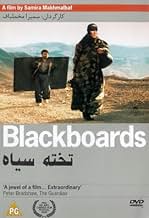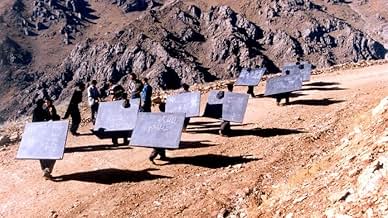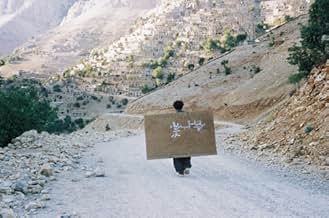IMDb-BEWERTUNG
6,8/10
2984
IHRE BEWERTUNG
Füge eine Handlung in deiner Sprache hinzuKurdish teachers Said and Reeboir roam Iranian villages near Iraqi border during war. Said guides displaced men, marries widow Halaleh. Reeboir joins child smugglers. Amid danger, they try t... Alles lesenKurdish teachers Said and Reeboir roam Iranian villages near Iraqi border during war. Said guides displaced men, marries widow Halaleh. Reeboir joins child smugglers. Amid danger, they try teaching nomadic students while soldiers patrol.Kurdish teachers Said and Reeboir roam Iranian villages near Iraqi border during war. Said guides displaced men, marries widow Halaleh. Reeboir joins child smugglers. Amid danger, they try teaching nomadic students while soldiers patrol.
- Regie
- Drehbuch
- Hauptbesetzung
- Auszeichnungen
- 3 Gewinne & 3 Nominierungen insgesamt
Empfohlene Bewertungen
Beautiful film about what happens when loftier ideas of learning and education meet the stark reality of day-to-day existence of nomadic Kurdish refugees.
This story moves through the dusty Iran/Iraq landscapes like a painful wheeze, yet compels you stay on the path, mindful of every step.
I find this especially moving now, during these gut-wrenching times in which we live, and considering the US's tattered and torn relationship with the people of the Middle East.
If you're looking for star power, look elsewhere. I've not seen or heard of any of these actors, but I was completely satisfied with their genuine performances. This film is also subtitled, so some may consider that a deterrent but I didn't because the pacing of this movie allowed for it.
Definitely worth a view, especially if you are a person who enjoys films that juxtapose the behavior of mankind vs. the human spirit.
peace.
This story moves through the dusty Iran/Iraq landscapes like a painful wheeze, yet compels you stay on the path, mindful of every step.
I find this especially moving now, during these gut-wrenching times in which we live, and considering the US's tattered and torn relationship with the people of the Middle East.
If you're looking for star power, look elsewhere. I've not seen or heard of any of these actors, but I was completely satisfied with their genuine performances. This film is also subtitled, so some may consider that a deterrent but I didn't because the pacing of this movie allowed for it.
Definitely worth a view, especially if you are a person who enjoys films that juxtapose the behavior of mankind vs. the human spirit.
peace.
Blackboards is a very good film: well acted and engaging. The story is fresh: a group of Iranian teachers with blackboards on their backs, trying to each undereducated Kurdish refugees how to read, write, count, et cetera.
The film is filled with endearing characters: a sharp young boy working as a mule, a teacher desperately trying to teach those around him, an old man with urinary problems, a woman whose chaotic life has been extremely painful and just wants to be able to hold on to her son. Samira Makhmalbaf has revealed herself as a humane filmmaker with a good eye for drama in everyday life. The film is honest in its vision of a world where reading and writing seem so useless, where the only thing that matters is the ability to keep on moving. That is what makes the teachers' attempts to teach the many refugees so pathetic. I feel that a good filmmaker like Makhmalbaf, someone who has a story to tell and knows how to tell it, is better than the dozens of pretensions auteur filmmakers with their overblown visions and obnoxiously pointless powerhouse melodrama.
The film is filled with endearing characters: a sharp young boy working as a mule, a teacher desperately trying to teach those around him, an old man with urinary problems, a woman whose chaotic life has been extremely painful and just wants to be able to hold on to her son. Samira Makhmalbaf has revealed herself as a humane filmmaker with a good eye for drama in everyday life. The film is honest in its vision of a world where reading and writing seem so useless, where the only thing that matters is the ability to keep on moving. That is what makes the teachers' attempts to teach the many refugees so pathetic. I feel that a good filmmaker like Makhmalbaf, someone who has a story to tell and knows how to tell it, is better than the dozens of pretensions auteur filmmakers with their overblown visions and obnoxiously pointless powerhouse melodrama.
10Red-125
This wonderful movie (shown here as "Blackboards") demonstrates the power of cinema to communicate circumstances and situations that are totally alien to those of us watching in comfort during a U.S. film festival.
The Director/Screenwriter, Samira Makhmalbaf, literally learned her trade at her father's elbow. He taught her well. Makhmalbaf was only twenty years old when she made this movie, but she has already acquired the skilled director's eye for filmmaking.
The locale in which the film is set is totally alien to me. The mountains of Iran offer stones and more stones. I believe this is the first picture I have ever seen where there is not a single image of a tree or even a green plant. The mountains are made of rocks, and the homes are made of rocks, and most of the characters in the the films spend their time climbing up, down, and between the rocks.
In this incredibly harsh, barren, non-nurturing environment, two young teachers carry blackboards on their backs and try to find someone--anyone--who wants to learn to read and write, and who can pay for this instruction.
Obviously, the teachers are motivated by their basic needs for food, water, and shelter, but--like all good teachers-- they are also motivated by the desire to teach.
Each teacher attaches himself to a group of people moving across a border. (I was never sure which border this was--I think it was from Iran to Iraq.)
Each group has endured hardship and tragedy, and their journeys are filled with the threat of danger. Despite this, the teachers continue their attempts to teach.
This movie was not only powerful, but it was informative. Anyone who thinks the mountains of Iran are more or less like the mountain meadows Julie Andrews encountered when she sang "The hills are alive with the sound of music," needs to see "Blackboards." Despite this hardship, human beings survive, and their desire to learn and to teach survives as well.
An amazing film--not to be missed!
THIS FILM WAS SEEN AT THE LITTLE THEATRE, DURING THE HIGH FALLS (ROCHESTER, NY) FILM FESTIVAL. THIS FESTIVAL IS NOT LARGE, BUT THE QUALITY OF FILMS IS OUTSTANDING. WOULD BE WORTH A SPECIAL TRIP IN 2003!
The Director/Screenwriter, Samira Makhmalbaf, literally learned her trade at her father's elbow. He taught her well. Makhmalbaf was only twenty years old when she made this movie, but she has already acquired the skilled director's eye for filmmaking.
The locale in which the film is set is totally alien to me. The mountains of Iran offer stones and more stones. I believe this is the first picture I have ever seen where there is not a single image of a tree or even a green plant. The mountains are made of rocks, and the homes are made of rocks, and most of the characters in the the films spend their time climbing up, down, and between the rocks.
In this incredibly harsh, barren, non-nurturing environment, two young teachers carry blackboards on their backs and try to find someone--anyone--who wants to learn to read and write, and who can pay for this instruction.
Obviously, the teachers are motivated by their basic needs for food, water, and shelter, but--like all good teachers-- they are also motivated by the desire to teach.
Each teacher attaches himself to a group of people moving across a border. (I was never sure which border this was--I think it was from Iran to Iraq.)
Each group has endured hardship and tragedy, and their journeys are filled with the threat of danger. Despite this, the teachers continue their attempts to teach.
This movie was not only powerful, but it was informative. Anyone who thinks the mountains of Iran are more or less like the mountain meadows Julie Andrews encountered when she sang "The hills are alive with the sound of music," needs to see "Blackboards." Despite this hardship, human beings survive, and their desire to learn and to teach survives as well.
An amazing film--not to be missed!
THIS FILM WAS SEEN AT THE LITTLE THEATRE, DURING THE HIGH FALLS (ROCHESTER, NY) FILM FESTIVAL. THIS FESTIVAL IS NOT LARGE, BUT THE QUALITY OF FILMS IS OUTSTANDING. WOULD BE WORTH A SPECIAL TRIP IN 2003!
I have nothing against slow movies -- for instance kiarostami is a huge favorite of mine. But I have to admit, this film really pushes the slow-and-obtuse envelope. it's mainly the script. the teachers encounter various nomads and desperately harangue them to hire them as teachers... when people refuse, they just repeat themselves again and again, and it seems that nobody really listens to anyone else. it's a study in harshness. it leans heavily on symbolism, and you feel that the whole thing is totally constructed by the filmmaker, that no respect at all is being paid to naturalism or the kinds of reactions that people would likely have in a situation like this. so, if you're really excited by a symbol-filled, quite stark time, you will appreciate this. I wasn't up for it.
'Blackboards' is one of those films that has divided audiences between fanatical admirers and grumbling dissenters. The former admire the director's skilful juggling between formalism and humanism, individual quests and social movements, private moments and public set-pieces; her filming of landscape; her eliciting of unsentimental, compelling performances from an amateur cast; her insistence on enigma and loose ends; her portrait of life in extreme, harrowing conditions. The dissenters bemoan her fudging of politics - sure, she shows the exploitation of children, the mass displacement of the Kurds, and the murderous terror lurking behind every rock, but by refusing to put these in a contextual framework, such depictions are blunted in political force.
there is a whiff of misogyny to me in these complaints. It's okay for men to make ambitious, universalising statements, but women must remain concerned with the local. Presumably Makhmalbaf would have been more political if she had concentrated on authenticating the patterns on the women's dresses. Of course, culture in general has moved towards the local: with post-modernism, very few artists have had the confidence to think on a large scale (I don't mean make large-scale films, which any fule kan do).
This is presumably why 'Blackboards' reminds me of older types of artists. Most immediately, it could be a massive Beckett play, full of wandering vagrants in a vast, desolate landscape, peopled with Lucky-like slaves, surrounded by an unseen, God-like menace, occasionally erupting in capricious violence. Like Beckett, there is no real beginning or end, no context, just a sense of never-ending repetition with the only possible relief in death.
Like Beckett (eg 'Waiting for Godot'), culture has no place in such an environment, indeed, seems a grotesque irrelevance, an incomprehensible babble, traces scraped in a landscape no-one can read now, never mind in the future. And yes, the film is as unremittingly hopeless as a Beckett play - there is no progress or redemption here. But it is as bleakly funny too - eg the whole marriage farrago between Said and Hahaleh; the game of marbles watched by her son; the tragicomic, very Beckettian inability of her aged father to relieve himself.
In the film world, 'Blackboards' reminds me of no-one so much as Angelopolous, especially in a film like 'The Travelling players', where a group of itinerant outsiders observe and become absorbed in an unfamiliar community. Makhmalbaf has Angelopolous' confidence in allegory, a way of dramatising in mythic form life and displacement under a totalitarian regime, without in any way 'abstracting' the violence and pain.
The empty landscapes suddenly being inexplicably over-run by faceless crowds also has the millenarial feel of Andersen's recent 'Songs from the second floor', or later Bunuel, from whom the theme of the journey, coming across strange, surreal strangers (eg the uncanny scene with the masked gardener whose son languishes in an Iraqi jail), or images such as the blackboard-hauling men like grounded birds watching blackbirds in the sky, and overhearing another, ominous, unseen flying object, derives. There are many, many ways of being political.
Unlike these masters, however, who prefer irony and distant tableaux, Makhmalbaf, through restless handheld camerawork, gets right in between her characters and makes us feel for them.
there is a whiff of misogyny to me in these complaints. It's okay for men to make ambitious, universalising statements, but women must remain concerned with the local. Presumably Makhmalbaf would have been more political if she had concentrated on authenticating the patterns on the women's dresses. Of course, culture in general has moved towards the local: with post-modernism, very few artists have had the confidence to think on a large scale (I don't mean make large-scale films, which any fule kan do).
This is presumably why 'Blackboards' reminds me of older types of artists. Most immediately, it could be a massive Beckett play, full of wandering vagrants in a vast, desolate landscape, peopled with Lucky-like slaves, surrounded by an unseen, God-like menace, occasionally erupting in capricious violence. Like Beckett, there is no real beginning or end, no context, just a sense of never-ending repetition with the only possible relief in death.
Like Beckett (eg 'Waiting for Godot'), culture has no place in such an environment, indeed, seems a grotesque irrelevance, an incomprehensible babble, traces scraped in a landscape no-one can read now, never mind in the future. And yes, the film is as unremittingly hopeless as a Beckett play - there is no progress or redemption here. But it is as bleakly funny too - eg the whole marriage farrago between Said and Hahaleh; the game of marbles watched by her son; the tragicomic, very Beckettian inability of her aged father to relieve himself.
In the film world, 'Blackboards' reminds me of no-one so much as Angelopolous, especially in a film like 'The Travelling players', where a group of itinerant outsiders observe and become absorbed in an unfamiliar community. Makhmalbaf has Angelopolous' confidence in allegory, a way of dramatising in mythic form life and displacement under a totalitarian regime, without in any way 'abstracting' the violence and pain.
The empty landscapes suddenly being inexplicably over-run by faceless crowds also has the millenarial feel of Andersen's recent 'Songs from the second floor', or later Bunuel, from whom the theme of the journey, coming across strange, surreal strangers (eg the uncanny scene with the masked gardener whose son languishes in an Iraqi jail), or images such as the blackboard-hauling men like grounded birds watching blackbirds in the sky, and overhearing another, ominous, unseen flying object, derives. There are many, many ways of being political.
Unlike these masters, however, who prefer irony and distant tableaux, Makhmalbaf, through restless handheld camerawork, gets right in between her characters and makes us feel for them.
Wusstest du schon
- VerbindungenFeatured in Samira cheghoneh 'Takhté siah' rol sakht (2000)
Top-Auswahl
Melde dich zum Bewerten an und greife auf die Watchlist für personalisierte Empfehlungen zu.
- How long is Blackboards?Powered by Alexa
Details
Box Office
- Bruttoertrag in den USA und Kanada
- 23.520 $
- Eröffnungswochenende in den USA und in Kanada
- 3.416 $
- 8. Dez. 2002
- Weltweiter Bruttoertrag
- 41.772 $
Zu dieser Seite beitragen
Bearbeitung vorschlagen oder fehlenden Inhalt hinzufügen

Oberste Lücke
By what name was Schwarze Tafeln (2000) officially released in India in English?
Antwort




















